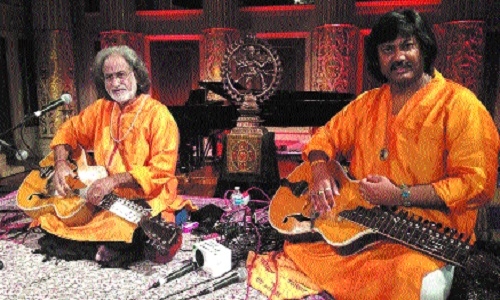‘Music transfers one into realm of spirituality’
27 Jun 2024 11:32:22

Staff Reporter
Pandit Vishwa Mohan Bhatt along with his son Salil Bhatt came to perform in the city under the banners of Pranati on Wednesday. Notably, Pt Vishwa Mohan Bhatt is a globally acclaimed artist and has also been bestowed with Padma Bhushan and Grammy award for his contribution towards Indian classical music. He is also credited for inventing Mohan Veena. Taking forward his legacy, his son and disciple Salil Bhatt (who is the inventor of Satvik Veena) has also brought laurels to the country by showcasing his talent at several stages including SAARC summit.
On the sidelines of the event, ‘The Hitavada’ also talked to the maestros about music and its varied aspects bringing along their experiences and learnings for the readers. Excerpts from the conversation:-
Q. How does music originated?
Salil:- To be clear of the concept, music is something that transfers one into the realm of spirituality. It is a sadhna. This is a divine concept and is not as shallow as performing on a stage for a short duration. It is yog. Yog or Yoga came from Jog which is a Raga and is believed to be invented by Lord Shiva. Even the Shiva Tandava Strotam (composed by demon king Ravana) is composed in Raga Jog. The demon king was also a revered musician who also invented Rudra Veena through his blood vessels. There are also instances when in the effect of ego, Ravana considered him as superior and furious Lord then taught him a lesson. Realising his mistake, he did ‘Alap Vilaap’ and was then forgiven by the lord. Such is the origin of music.
Q. You (Pt Vishwa Mohan Bhatt) belong to Bhatt family of Jaipur which has a musical tradition in itself and have learnt under the tutelage of Pandit Ravishankar of Maihar Gharana. Also, Mand form of singing is also famous in the state where you come from. How you have managed to incorporate these styles in your music? Pt Vishwa Mohan Bhatt:- One should try to include every form or style of music in order to achieve oneness with the nature. I was fortunate enough to learn under Pandit Ravishankar of Maihar and my mother belonged to Jaipur gharana and I also learnt by her. So through them, I managed to learn both styles. Upon them it is the legacy of the Bhatt family so it can be understood that how immense and deep the music is. Musical notes are only seven in number and when performing for an hour, it is a challenge that comes related to what we will perform for that duration, which should be entertaining, technically correct and should be also blissful to listen to. This becomes possible through Sadhna and Kala which makes a person understand that this art is the confluence of varied things, experiences and a result of an interplay of mental processes.
Q. There is a difference between western and Indian audiences. It is said that westerners have an analytical mindset whereas Indians have a holistic mindset. What differences do you observe in the audiences domestic and abroad?
Salil:- Audience in the west come with research and a proper mindset to watch the musical performance, whereas in our country, the spectators present themselves as spectators with a motive of passing time without any prior research. Though, there are some exceptions everywhere. Also, things have changed drastically with the advent of information and communication technologies and social media in this regard.
Q. It has been seen that two dichotomies are popular in the context in Indian music- urge to preserve and urge to continue. Preserving the old traditions and making it relevant in the contemporary times. Both of you have worked on such ragas like Gavti. Can you share your experiences while working on such Ragas? Pt Vishwa Mohan Bhatt:- I believe that we can only inherit ten percent of our forefathers. Raga is a great thing. This is the worship of Saraswati (goddess of knowledge). A musician prays and requests a Raga to come over and bless them with their eternal bliss of music and purity. When the Raga agrees to come, the magic begins. One should be aware of aspect of Raga and this process can happen anywhere whether in temples or on stage.
Salil:- Gavti is a rare raga and is our much favourite raga to play. My dada guru (guru of the guru) introduces Carnatic ragas into Hindustani classical music and popularised many ragas in the northern sphere of the country. Q. What do you think of the younger generation? Do you think they are lacking? Along with this, how do you strike a balance between inculcating the traditional aspects of the music and also give them space to foster their creativity and experimentation?
Pt Vishwa Mohan Bhatt:- This is something which requires attention and proper time. Every budding artist has some area and limitations. A good teacher tries to unleash new areas of thinking for him/her and broaden their horizon by giving them immense possibilities to flourish to make them unstoppable.